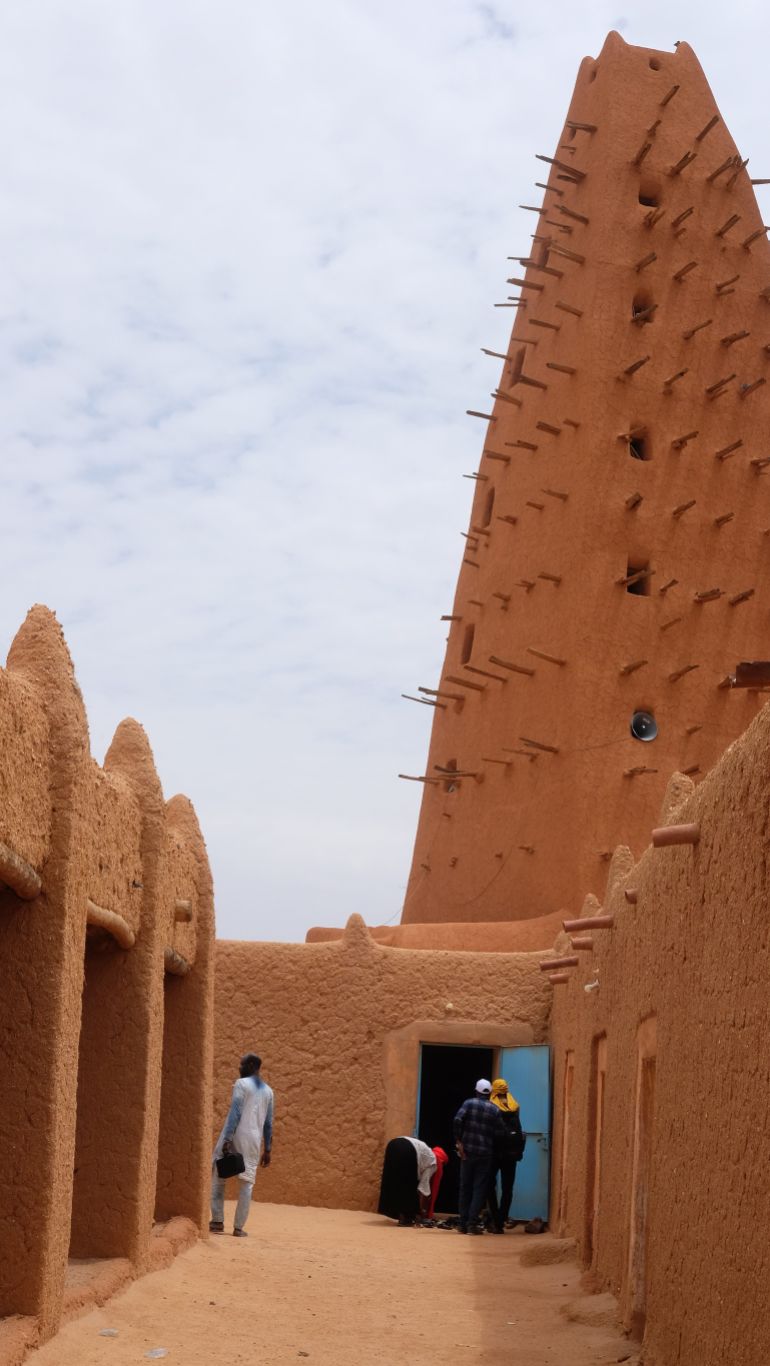Elhadj Amadou Dizi Illo sat on a low stool in his souvenir shop in Agadez on a scorching July afternoon as he dumped a heap of adorned knives on the floor. He was covered in sweat and had a bright yellow turban.
Opposite the store, a sign on a brown, mudbrick building with lattice doors announced the Hotel Auberge, which has long closed down. Another structure, which was two stories down, had the bold writing “Antiquite” in bold chalk on it. It, too, was closed. Outside, women in long, sweeping hijabs and men in turbans walked past, shouting hellos, as a roaming tea seller stopped to prepare glasses of ataya – a mixture of green tea, mint and sugar.
Illo focused on his task while cleaning and dubbing inside. At age 63, he is tall and stately with a serene presence. His milky eyes crinkle when he smiles generously and his lips are framed by a gray moustache and beard.
Illo’s store is one of the last few souvenir vendors still operating in the old Nigerien city.
Packed and stuffy, the mud structure barely has enough room for more than one person. A bronze cup from somewhere in the desert, silver knives sheathed in dusty green and brown leather cases made by Agadez’s skilled artisans, and chunky beaded necklaces from Ghana are on the shelves.
Despite staying open for several hours, no buyers came in aside from two teenage boys. They exchanged knives for several minutes before turning their heads and leaving with empty-handed in the opposite direction.
“It’s hard”, Illo said, his French soft and singsongy. Standing up slowly in the cramped space, he braced himself on achy knees. “Life is difficult for anyone who works in tourism,” he said. We have to endure it”.
Due to its location, Agadez, the ancient city of Tuaregs, has always been a natural crossroads between continents and cultures. Called the “gateway to the Sahara”, it was in this hot, arid savannah that camel-drawn caravans loaded with ceramics and silk from Arabia, or gold from West African kingdoms in present-day Ghana and Nigeria, stopped to rest during the trans-Saharan trade between the 8th and 16th centuries.
A two-minute walk from Illo’s store, the Grand Mosque – the world’s tallest mudbrick building – stands as a testament to this history. Its pointed minaret has functioned as a compass and watchtower for travelers for centuries.
The building itself is built out of wooden beams and mudbricks, called banco. The skilled craft of using sun-dried bricks was learned by Tuareg artisans in Mali’s Timbuktu. It is the same unique material and technique used throughout the entire old town, earning the area a UNESCO World Heritage Site stamp in 2013.
Travellers and architecture buffs came from all over the world to see the ancient wonders for decades, boosting the local economy. Up until the late 1980s, when a Tuareg revolt sparked an armed conflict, thousands of tourists a month, largely from Europe, gaze at the old mosque and stroll through the old town’s gridded streets, which are based on how the first Tuareg settlers organized camps based on sub-tribes. The revolt ended tourism.
Today, the building continues to fascinate the few tourists who come by, even though getting to the very top is much harder than it looks. You have to crouch low to the ground and move up the steep stairs of the minaret in slow shuffles, as the narrow passage tightens with every step. Then, you must pass a colony of shrieking bats before squeezing through a tiny hole to gingerly ascend to the top.
For those who dare, the climb is worth it. The old town is typically drenched in warm colors by the golden glow of the sunset on most evenings. Row after row of squat mud structures spread out in all directions, as though paying homage to the mosque. Five times a day, a muezzin solemnly calls the adhan to signal the time for prayer, the sound riding on the breeze. The symphony is augmented by loud tricycle and motorcycle riders and children playing in the courtyards.
A once-booming Agadez has fallen on tough times since the revolt, and tourism profits have long faded. The lack of customers, shuttered hotels and souvenir shops, as well as deteriorating infrastructure, reflect the sewage that is now pouring down into sandy streets, which is left behind. It is also evident in the different clientele now plying those old caravan routes: irregular immigrants desperate to brave the desert to reach Algeria or Libya, and eventually, Europe, for a new life.
The best 10 years
Even the city’s veterans occasionally want to leave, at least temporarily, to sluggishly get away from the silence.
“If I could, I would go to Algeria”, said Illo, speaking of how far he would travel to be able to sell his goods and make money. He claimed that Algeria’s tourism industry is flourishing. “But I am not as strong as I used to be. My heart is not strong enough. I’m going, but I’m going, and I’m going to never go back.
Illo first began trading back in the 1970s, barely an adult at the time.
He purchased local goods and sold them to European curators of galleries and museums. He even exhibited his collection in several countries. Many of his customers were German-speaking, so when he first got a store space, he named it Schmuck Laden, which means jewellery store.
His first international exhibition was in Germany, followed by another in the country’s neighbor, Nigeria. On his travels, Illo picked up languages, complete with accents. His German has a Bavarian twist. His Yoruba, although jerky, is of the Lagos variety.
Tourism was the region’s bread and butter at the time, so it was not strange for young men like Illo to double as tour guides. Around 200 kilometers (124 miles) away, the Air Mountains, which are in stark contrast to the desert’s low-level dunes, would be explored by him. He took them as far as the black and ochre salt mines of Bilma, a five to six-hour drive from Agadez, where workers loaded the white stuff onto camels to transport down to Nigeria for sale.
He claimed that it is impossible to determine how many people I guided or how many of them were clients. Over the years, many have kept in touch with him, sending letters from time to time, all of which he keeps safe in a big canvas bag in his home. “The best month was December because the weather is nicer and cooler. Our winter is here. We had a cook]for the tourists] who would make salads for lunch and a hot meal, like spaghetti, for dinner”, he reminisced.
The ten years 1980 to 1990 are the ones that are most in Illo’s memory the most vivid. Those were the years of the Dakar Rally, an off-road racing event that began as a race from Dakar, Senegal to Paris, France, but that has since emigrated from the continent to Saudi Arabia due to more than a decade of insecurity from armed groups swarming the Sahel, from Mali to Niger.
Back then, when the cars raced towards Agadez in dust-raising fury, the whole town would line up by the roadside to cheer them on. Illo said it resembled a party. Taxi drivers got more clients in that period, and locals would take the opportunity to rent out their houses for a few nights to the moving party.
Illo sighed in his store, wiping his forehead as though wiping the thought away, as though the excitement of the old days of good money were over. Resentment and fury at the government spiralled into armed fighting that shut the doors to that life.

Rebellion season
Trouble began brewing in northern Niger in the late 1980s, when Tuareg armed groups formed, aiming to fight for autonomy. Despite the mineral revenues that are generated by their land, particularly gold, minority Tuareg communities have long accused their governments of being neglected in the Sahelian nations. Famine in the Tuareg regions of Niger and Mali between 1982 and 1985 caused thousands to be displaced, and hundreds to become refugees in camps in Algeria and Libya, although the exact number is unclear. In the camps, those who felt aggrieved that they were experiencing famine while their governments profited from their land met and formed alliances.
In May 1990, there was the first armed attack. Tuareg separatists attacked a police station in the town of Tchin-Tabarenden, some 400km (248 miles) from Agadez, five people were killed, while 25 of the attackers died. According to researchers, Nigeria’s military deployed soldiers in the area after the attacks, which led to “several hundred deaths.”
Between 1990 and 1995, as sporadic fighting raged, foreign governments evacuated their citizens, including from the neighbouring town of Arlit, where a French company mined uranium. Western governments like the United States declared Agadez a red zone and issued travel warnings to tourists, delivering a death knell to the city.
The armed rebellion wouldn’t end until 2007 despite a peace deal that had put the fighting in 1995. By then, the local economy had collapsed.
Armed militias and bandits are now the main culprits in the area, preventing further insecurity. The most powerful militia is the al-Qaeda-affiliated Jama’a Nusrat ul-Islam wa al-Muslimin (JNIM), which operates across the Niger, Mali and Burkina Faso tri-border area. It was founded by a Tuareg fighter who took part in earlier rebellions in Mali, and it aims to establish a caliphate. Two European women have been abducted in Agadez since January, according to some of the organizations that are alleged to have smuggled the area. JNIM has denied any involvement.
Niamey’s situation has gotten worse due to political unrest. Military regimes have come and gone in rapid succession in Niger since independence from France in 1960, but there was hope after the first-ever democratic transition in 2021. A military coup in July 2023 dashed those hopes.
Under General Abdourahmane Tchiani, the country has become more isolated, with the impact being felt by the already depressed tourism industry. Tchiani’s government cut ties with its ally, France, also expelling French troops, because Paris refused to back the coup. The US has also been evacuated from Base 201, a sprawling, expensive drone base located just behind the small Agadez airport. The base took three years to build and employed hundreds of locals.
Niamey has also been at loggerheads with its regional neighbours, after the Economic Community of West African States (ECOWAS) placed excruciating sanctions on the country and some of its leaders. Instead, Tchiani and other military leaders from Burkinabe and Mali formed the Alliance of Sahel States (AES). All three have turned to Russia for security and business. Russian military personnel in khaki greens loiter at the Agadez airport while Russian warplanes are waiting on the tarmac.

Old roads, new travellers
Local travel agents who once assisted tourists arriving in Niger and traveling through the Sahara switched their jobs as the city changed to deal with the thousands of migrants seeking entry to Libya and further along the Mediterranean to Europe.
In the crowded bus station on the outskirts of Agadez, passeurs – the agents who transport migrants from all over West Africa – sat at desks peering at papers, counting and recounting the names and numbers of passengers for the next convoy going into the desert. After midday, the temperature typically rises to 45 degrees Celsius (113 degrees Fahrenheit), before fading into the evening.
Passeurs were not always able to work openly. Under the former civilian government, collaboration with the European Union saw authorities dismantle what they called the smuggling industry that first took off in 2011 after Muammar Gaddafi’s regime fell in Libya. Transporters at the time realized that a leaderless nation could only travel for a certain length of time, all the way to the Mediterranean’s edge.
Quickly, people seeking passage began pouring in and, soon, the population of Agadez doubled to 300, 000 from the influx.
Some passeurs complained while others benefited from the new trade. Migrant communities clash with locals frequently due to deep-seated resentment, locals believe migrants encourage vices like smoking and drugs in their deeply traditional city, but migrants say locals here are not accepting enough of their differences.
The EU deal in 2015 under President Mahamadou Issoufou momentarily criminalised travelling through the desert, forcing passeurs underground. Passeurs here claim that the journey did not stop, but it did get more dangerous as drivers followed longer, untested, or long-abandoned routes, which left them vulnerable to armed groups and bandits. Since the military government took power in 2023, the EU deal has been abandoned. The migrant convoys are now being driven by army trucks into the desert for protection.
Each passenger pays 150, 000 francs ($267), said Addo, a popular passeur with a spacious office that was empty but for a single table and two chairs in a corner. A sign in front read: “Agadez-Dirkou”, referring to the Nigerien city further east where travellers will make a stop. The passeur explained from his seat that this is one of the route’s four stops. Addo’s phone rang often with his fellow passeurs calling to arrange more clients.
People sometimes cannot cross the street because of bandits or because they are thirsty; a malfunctioning car or a lost vehicle could leave them trapped for too long without water, Addo said. Sometimes, they do, and will then push forward through the sea to Europe, he added.

A young Agadez man’s young son leads a small group of people who are excitedly loading their luggage into the backs of a green pick-up truck thirty minutes from the bus station. Young men, women and a handful of children threw their luggage and bottles of water in before clambering into the back of the truck. Their knees were pressed together, and they were tightly packed. Drivers handed out sticks to those sitting on the edge of the truck. It is a sort of seatbelt, holding travellers in place as trucks zoom through the desert, going at breakneck speed to avoid bandits and armed groups. Drivers rarely stop, but those who don’t hold on too tightly can occasionally be thrown from the trucks.
Aminata, a middle-aged woman sitting in the middle of the truck who asked that her real name not be used, looked around, waiting for the vehicle to load. She wore a black jilbab, and the sun, which appeared to be ejecting from the truck, covered her face with a scarf. She had been briefed by the passeurs, said Aminata, who speaks rapidly in high-pitched Hausa. She knew the dangers on the road already: the car could break down in the middle of the desert, they could be without help for hours, or even days, armed bandits could attack them. In the scorching desert heat, she would spend four days squatting down in this cramped position, and she would spend the rest of the night outside. She knew, Aminata said, that some people never make it out of the desert. She remained determined.
A native of Kano State, in northern Nigeria, Aminata said she was embarking on the journey to provide for her children, whom she had left back home. There was nothing in Nigeria, she said. She was poor, and there was no way she could survive the current economic crisis there. Yes, the journey could be fatal, but God was with her, she said.
The loading was finished about an hour later. The truck driver, dressed in a loose grey kaftan and dark aviator sunglasses, got in the driver’s seat and turned the key in the ignition. He reversed slowly out of the yard. This group of migrants was too impatient to wait for the customary military escort, which had been postponed for a day due to administrative reasons, so the trip was not officially approved. As they drove off in a cloud of dust, the travellers waved goodbye to their counterparts, who had spilled out of the open gates of the house’s yard to see them off. Many of the people present are awaiting their departure. The travellers were still waving when the truck turned a corner and disappeared.
No place like home
The trader sat cross-legged on a prayer mat while looking through old documents in Illo’s large, sparsely decorated living room. Many were letters from his friends abroad, others were odds and ends that reminded him of the good times, like an old Lufthansa plane ticket, and the flyer of an art exhibition from 1993.
One of his eight daughters sat on a corner bed. A fan stood in front of the door, blowing hot air. Out in the yard, a little girl – Illo’s granddaughter – chit-chatted with a friend about something. They gesturing while speaking in low, serious tones.
Modest as it is, building his home was one of Illo’s proudest moments, judging by how frequently he mentions the feat. When he finished it, he was only 30. Before then, as a teenager, he lived with his neighbours: his father died when Illo was 16, and his mother moved back to her hometown away from Agadez, leaving just him. Illo did not want to leave the old town, though, so he simply moved next door until he saved enough to buy land and build his house.
He said, “I stayed there until I got married and bought my own home,” illustrating how generous people can be in the town. “If not in Agadez, where are you going to find something like that”? Although it’s harder for most people these days to be as hospitable as they once were, he continued, the spirit of giving is still strong.

Picking up one folded missive, Illo smiled as he examined the fading print. It was a 1982 purchase by a Geneva resident named Michel. He started to read it aloud.
He read, “I received your letter of March 18 in which you’re not content.” The full exchange tells of Illo asking Michel to send him 100 Swiss francs in exchange for a “promised gift”. In the end, Michel says he sent him 50 Swiss francs but never received the parcel.
Illo laughed giggling as he rummaged through the stack of letters before him, demonstrating the friendships the sexagenarian has built thanks to the city and his work. “I was barely 20,” Illo said savagely.
But much of that has now changed, Illo knows.
He is aware of the difficult process under the military regime for foreigners to obtain a visa for Niger. Authorities even seize passports from nationals of African countries they consider hostile, such as Nigeria, for a few days upon arrival.
The growing hostility to outsiders has changed the demographics of people visiting Agadez – and it is affecting locals, too. More than that, it means that some of his foreign friends may never be able to return to visit. It also means there are fewer sales at Illo’s souvenir shop.
“That’s the administration, not us”, Illo said, with a rare frown. Niger would not have met his clients, formed such lasting relationships with his clients, or traveled as widely as he has.
Loud banging on the gate of his compound interrupts Illo’s letter reading, causing him to rise and walk slowly towards the yard. A group of about 20 young men dressed in flowing purple robes, complete with elaborate headgear that fanned out like a peacock’s comb, poured into the yard, singing. They were a part of the Biannou Festival procession, which was once held annually but is now held every other year. The Tuareg festival often features three days of dance performances, parades and prayers, led by young men. Performers occasionally attend parties at homes of famous people, such as Illo, who is regarded as a sort of sage.
One of the performers banged on a drum as the men launched into a dance, encircling Illo. The vendor reached out to take the drum and hit up a fiery beat, earning him cheers from the small crowd. The men bid their farewells and left the yard after a few more minutes of dancing and drumming. Illo’s teenage daughter ran after them.
Illo chuckled as he leaped back onto the mat, thinking that it was crazy when he realized why he had chosen to stay put in Agadez despite having options for departures to Libya, Algeria, or another country.
Like him, his children and grandchildren can travel and see the world – even though he will never allow them to join the desert travellers. But after having journeyed far and wide, the best patch of the world, he said, is right here.






